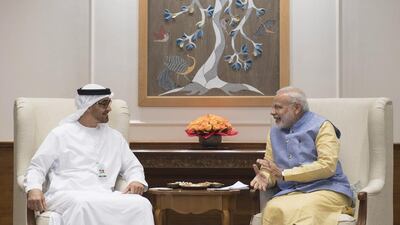The visit of Sheikh Mohammed bin Zayed, Crown Prince of Abu Dhabi and Deputy Supreme Commander of the Armed Forces, to India represents a significant milestone in cooperation between the two countries. While the UAE and India have always enjoyed convivial ties, the degree of convergence spearheaded by Sheikh Mohammed and Narendra Modi, India’s prime minister, carries positive ramifications for South and West Asia.
Sheikh Mohammed and Mr Modi are formally upgrading the bilateral relationship into a “comprehensive strategic partnership”. India accords only a select few nations with this status and it suggests that New Delhi and Abu Dhabi are working purposefully to shape positive political and economic outcomes.
Sheikh Mohammed said the UAE “views India as a linchpin of stability and security in the Asian continent”. While the old linkages of more than 2.2 million Non-Resident Indian workers making a living in the UAE and the steady supply of oil from the UAE to power India’s economic growth are ever-present, a deeper alignment distinguishes the current equation.
It is now India that is staking a claim to be the most reliable, stable and moderate partner to the GCC in the quest to counter extremism. Sheikh Mohammed and Mr Modi have said they will jointly fight this menace.
The UAE contingent of 200 air force personnel marching on India’s national parade on Republic Day is a demonstration of faith and belief that the two countries can present a joint front. The comprehensive strategic partnership is also furthering development and production of hi-tech weaponry.
Mr Modi’s accord with Sheikh Mohammed and his commitment to the UAE should not be underestimated. Although the Indian prime minister has also wooed investors from Saudi Arabia and Qatar, it is the UAE that he is particularly keen on.
The UAE’s relative openness to trade makes it an ideal gateway and a beachhead for India to anchor itself in West Asia.
Mr Modi’s casting of India as a land of economic opportunity for Emirati sovereign wealth funds and banks has also struck a chord.
The UAE has committed record amounts of investment into diverse sectors of the humming Indian economy. The UAE’s vision of long-term diversification into non-oil sectors means that India’s rapidly growing equities markets and infrastructure sector are automatic choices for guaranteed and high returns-on-investment.
Mr Modi has successfully deployed eminent businessmen and women based in Abu Dhabi and Dubai to raise India’s profile as an investment haven. The intent is crystal clear: what America or Europe cannot do for India financially because of their private sector-dominated economic systems, Mr Modi wants that impetus from the Gulf.
This deepening of ties between the UAE and India is also occurring against a backdrop of anxiety about the global role of the United States under Donald Trump.
While Washington is still a central pillar of the UAE’s international outlook, the outward and engaging approach that Mr Modi’s India brings to the table is a precious commodity. A new Asia based on reaching out rather than drawing inwards can only be built if likeminded parties such as the UAE and India huddle together.
Sreeram Chaulia is a professor and dean at the Jindal School of International Affairs in Sonipat, India. His most recent book is Modi Doctrine: The Foreign Policy of India’s Prime Minister

